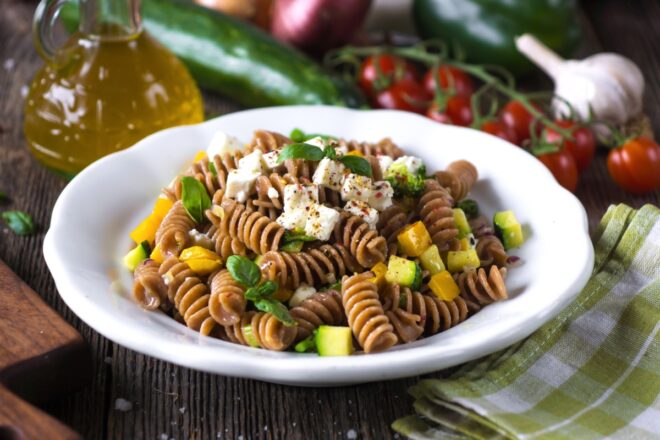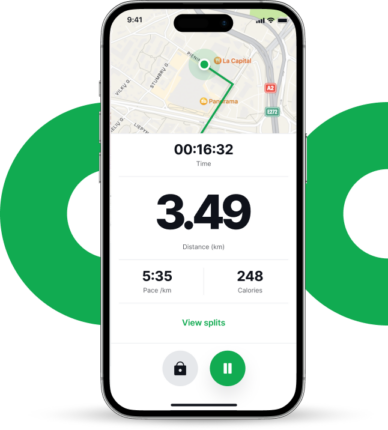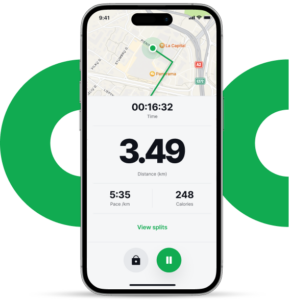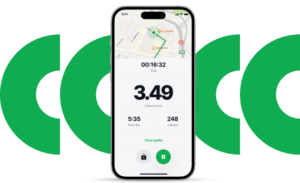Nutrition plays a crucial role in a runner’s performance and recovery. Therefore, it’s essential to know what to eat before and after running, and to establish a set nutrition plan that works for you. After all, properly fueling your body ensures you have the energy to achieve your peak performance and recover fully and quickly afterward.
Plus, eating the wrong foods or food combinations can quickly lead to runner’s stomach. It can leave you running to find a toilet as opposed to running to finish your planned route.
In this article, we lay it all out. What should you eat? When should you eat? Let’s find out!
In This Article
In This Article:
What Should Runners Eat?
A simple approach to healthy, proper nutrition and sustained energy is to keep the balance of carbohydrates, proteins, and fats in your diet.
Carbohydrates are the body’s preferred source of quick energy. Whole grains, fruits, and vegetables are excellent sources of complex carbohydrates that provide sustained energy during a run.
Protein is another vital component of a runner’s diet. It aids in the repair and recovery of muscle tissue after strenuous activities. A study published in the Journal of Sports Sciences suggests consuming 1.2 to 1.4 grams of protein per kilogram of body weight per day for endurance athletes.
Fats, especially omega-3 fatty acids found in fish, nuts, and flaxseeds, help reduce inflammation and are essential for cellular function. However, it’s important to consume fats in moderation as they are calorie-dense.
Tip: Amino acids are essential for muscle repair and reducing fatigue. To get enough, focus on a protein-rich diet and consider supplements, especially after an intense, long run.
What to Eat Before Running
Wondering what to eat before running for more energy and endurance? When it comes to proper fueling for your run, it’s essential to focus on food rich in carbohydrates and relatively low in fats and fiber – and therefore easily digested.
Opting for complex carbs can offer you sustained energy throughout your run. A small amount of pre-run protein can also be beneficial.
Let’s look at some more examples of what to avoid and what to eat before a run.
| What to eat | What to avoid |
| Complex carbohydrates: Whole-grain bread toast, wholewheat pasta, brown rice, sweet potato, quinoa, oatmeal, banana with peanut butter, energy bar, cereal with milk, overnight oats. | Foods high in fiber: Beans, leafy greens, high-fiber vegetables, like broccoli, and high-fiber berries, like raspberries or strawberries. |
| Proteins: Eggs (especially egg whites), Greek yogurt, tofu, lean chicken or turkey, low-sugar protein powder shake. | High-fat foods: Nuts, avocado, fatty cheese, bacon, or any other fried foods. |
| Hydration: Water or a sports drink for longer runs. | Spicy food: Hot peppers, excessive seasoning. |
Moreover, the timing of your meal is crucial. Most runners find a two-hour window between a meal and a run to work best. This allows you to feel energized yet light.
What to eat before a big morning run? Eat early or ensure a good dinner rich in carbohydrates and protein the evening before.
Tip: Choose low-fiber simple carbs for easier digestion. A bit of caffeine can also boost pre-run energy.
Avoiding runner’s trot
Runner’s trot refers to a sudden bowel movement, during or after a run. Luckily, focusing on what you eat before a run can help.
Foods rich in fiber, fatty foods, and dairy products are more likely to cause digestive issues when you’re running. These foods can trigger gastrointestinal discomfort and should generally be avoided before you hit the pavement.
Instead, opt for small, easily digestible meals or snacks that provide the energy you need without gastrointestinal distress. Understanding your body’s reaction to different foods can make a world of difference in your running experience.
Avoiding stomach cramps
Stomach cramps can occur due to poor eating habits before a run, dehydration, shallow breathing, or pushing yourself too hard.
To avoid this issue, consider consuming a small, easily digestible meal about 1-2 hours before your run, and make sure you’re adequately hydrated. Avoid carbonated beverages and foods high in fiber, as these can exacerbate cramping.
If you experience stomach cramps during your run, slow down and adopt a deep, rhythmic breathing pattern. You can also gently massage the affected area or bend forward slightly to relieve the pain.
Remember, sometimes it’s better to cut a run short than to push through discomfort, which could lead to more severe issues later. Listen to your body and adjust your pace and diet accordingly.
What to Eat After Running
After the run, your body is in a state of recovery, and what you choose to eat can impact how quickly you bounce back. The post-run meal is an opportunity to replenish lost glycogen, repair muscle tissue, and rehydrate.
Aim for a balanced meal that includes a combination of carbohydrates, protein, and fluids within 30 minutes to two hours after your run for optimal recovery.
Carbohydrates: Opt for complex carbs like quinoa, sweet potatoes, or whole-grain pasta to refuel your glycogen stores.
Protein: Incorporate more protein, such as grilled chicken, tofu, or a protein shake, to assist in muscle recovery.
Hydration: Don’t underestimate the power of rehydration. Drink water or opt for an electrolyte-infused sports drink to regain the fluids lost during your run.
FAQ
What foods to avoid after running?
While every runner is different, there are some general foods to avoid before and after your run.
Before hitting the pavement, it’s best to avoid high-fiber foods, spicy dishes, and fatty foods, as they may lead to gastrointestinal issues, like runner’s trot.
After your run, try to stay away from sugary snacks or drinks that can spike your blood sugar but don’t provide lasting nutrition for recovery.
What should I do before and after running?
Focus on consuming a light snack or an easily digestible meal rich in carbohydrates and low in fats and fiber one to four hours pre-run. This will give you sustained energy without weighing you down.
After you cross the finish line, aim for a balanced meal that includes carbohydrates for glycogen replenishment, protein for muscle recovery, and fluids to rehydrate. Also, ensure you consume foods rich in amino acids to aid muscle repair and delay fatigue.
Should I eat before or after jogging?
Whether to eat before or after jogging can depend on the individual, but there are some general guidelines. Eating a meal balanced with proteins and carbohydrates one to two hours before your jog can provide you with sustained energy and may help you avoid discomforts like stomach cramps.
Energy bars, yogurt with berries, or a banana with peanut butter are all good ideas for a pre-run snack.
After jogging, it’s also a good idea to eat a meal or snack that includes a mix of carbohydrates and proteins to aid in recovery and muscle repair. Try to eat within 30 minutes to 2 hours post-jog for optimal recovery. Opt for water or sports drinks to replace lost fluids.
Takeaways
Navigating what to eat before and after running can be overwhelming, but a few key principles can make a significant difference in your running performance and recovery.
- Balanced diet: A well-rounded diet that includes carbohydrates for quick energy, proteins for muscle recovery, and fats for cellular function is essential.
- Right timing and food: Have a small meal or snack approximately two hours before running. Easily digestible foods with a balance of carbohydrates and protein can give you a good idea of what to eat before a run.
- Foods to avoid: Steer clear of high-fiber, fatty, or spicy foods that can disrupt your digestive system and lead to issues like runner’s trot or stomach cramps.
- Individualized approach: Everyone’s body is different. Don’t be afraid to experiment to find the food and timing that works best for you. You could try eating according to your metabolic type, for instance.
Looking for a guide to kickstart your running and nutrition journey? The Joggo app has got you covered. Tailored to your goals, Joggo offers a personalized running plan, along with a meal plan, created around your favorite food. Take our quick quiz and start building a blueprint for a healthier, fitter you.
References:
- Jones, K., What to Eat Before Running.
- Rothschild, J.A., Kilding, A.E. and Plews, D.J., 2020. What should I eat before exercise? Pre-exercise nutrition and the response to endurance exercise: Current prospective and future directions. Nutrients, 12(11), p.3473.
- Clark, N., 2011. Fueling for training: what to eat before, during, and after you exercise. Palaestra, 25(3), pp.41-43.
- DeSimone, G.T., 2018. SHAREABLE RESOURCE: What to Eat Before, During, and After Exercise. ACSM’s Health & Fitness Journal, 22(4), p.5.
- Kilding, A.E. and Plews, D.J., 2020. What Should I Eat before Exercise? Pre-Exercise Nutrition and the Response to Endurance Exercise: Current Prospective and Future Directions. Nutrients, 12(11), p.3473.
- Applegate, L. and Applegate, E.A., 2001. Eat Smart, Play Hard: Customized Food Plans for All Your Sports and Fitness Pursuits. Rodale.














